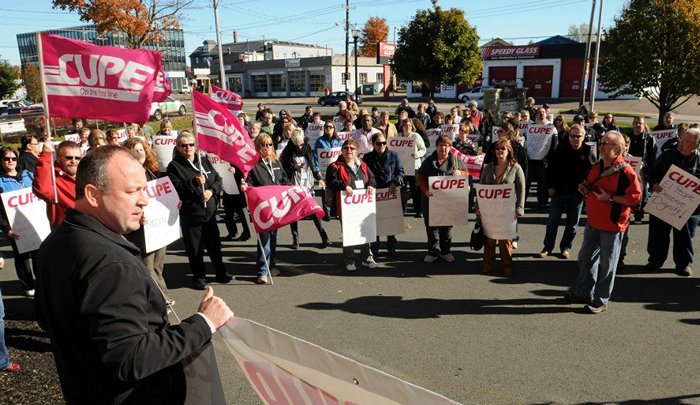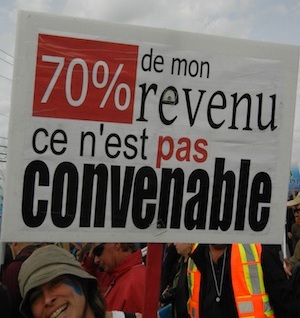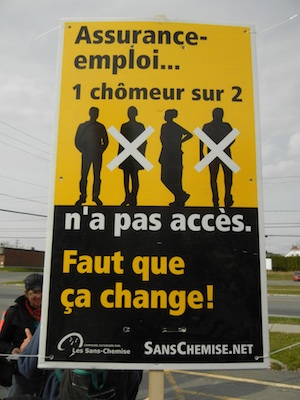
|
October 30, 2012 - No. 137 Harper Government's Attack on Employment Insurance Mass Actions in Quebec and Maritimes Denounce Anti-Social Reforms Thetford Mines, Quebec, October 27, 2012 Harper
Government's
Attack
on
Employment
Insurance Harper Government's Attack on Employment Insurance Mass Actions in Quebec and Maritimes Denounce Anti-Social ReformsOn October 27, actions took place in Quebec and the Maritimes to denounce the Harper dictatorship's cuts to Employment Insurance (EI). The changes to EI are an attack on the national economy and regional resources, and an attack on workers' dignity and right to a livelihood. The workers create society's wealth, a portion of which funds the EI program, and they have the right to the necessary assistance during periods of unemployment or when they lose they jobs. Thetford Mines, QuebecMore than 3,000 workers and unemployed people across Quebec rallied on October 27 at Thetford Mines.
Labour organizations present included the Quebec
Federation of Labour (FTQ) the Confederation of National Trade Unions
(CSN), the Confederation of Democratic Trade Unions (CSD), the Public
Service Union of Quebec (SFPQ) and regional councils of the trade union
centrals, as well as unionized construction
and electrical workers and unionized heavy equipment operators. Many
defence organizations of the unemployed from various regions including
member organizations of the Autonomous Movement in Solidarity with the
Unemployed (MASSE) also participated. Also present were representatives
of the Bloc Québécois,
the NDP and the Marxist-Leninist Party of Quebec (PMLQ). The
demonstration was called by a Coalition made up of MASSE, the union
centrals, the FTQ, CSN, CSD, the Quebec House of Labour (CSQ), as well
as the SFPQ. The action was called to denounce with a united voice the changes to the Employment Insurance Act announced at the end of May by the Harper government in the omnibus budget bill, Bill C-38. The changes give Minister of Human Resources Diane Finley, the discretion to pass regulations which modify the eligibility and retention of Employment Insurance benefits, without approval by Parliament. On May 24, Minister Finley announced she will adopt regulations that force EI recipients to accept jobs at drastically lower wages or which may force them to travel long distances, or else be cut off their benefits. Speakers pointed out that the EI program is funded entirely by contributions from employers and workers and that the government has no business interfering with it. They also denounced the attacks on public services through the Harper government's massive layoffs in the federal public sector and that the fight on these matters is just beginning. The fall edition of Forum ouvrier which calls on the working class to build its independent politics was widely distributed at the action by PMLQ activists. Workers were eager to discuss the problems caused by the Harper government's nation-wrecking, including the reforms to EI. Other Quebec actions are being prepared to oppose the
changes to EI, including a demonstration in the Magdalen Islands on
November 3.   Maritimes    Workers demonstrating in Campbellton, New Brunswick, across the Ristigouche river from Quebec, were joined by workers from the entire Gaspésie region, including La Pocatière, Rivière-du-Loup, Rimouski, Témiscouata and Matane, who marched across the J.C. Van Horne Bridge, forming one contingent of more than 1,500 people. In Truro, Nova Scotia, about 200 people demonstrated. Danny Cavanagh, President of the Canadian Union of Public Employees Union-Nova Scotia, underscored that, "Our biggest concern is the cuts to Employment Insurance, especially among seasonal workers." In Summerside, Prince Edward Island, hundreds of people
took to the streets with the slogan "Harper must go." The organizers
also saluted that actions taking place in Quebec and the rest of the
Maritimes to denounce with one voice the anti-social Harper government.   Truro, Nova Scotia   Summerside, PEI Excerpts from
Statements and Speeches -- Thetford Mines
|
 "70 per cent of my income is not fair." |
We are an organization that defends the rights of those who are seeking employment and also of those who have lost their jobs. [Our organization] also defends the right of welfare recipients to receive help when they need it. We work in the L'Érable Regional County Municipality. The problem with the EI reform is that it will force people to work in any field. Take for example the case of teachers who are unemployed during the summer, everyone knows that when teachers aren't permanent employees, they are under contract for several years and will frequently end up on employment insurance. The consequences are that they will have to find a job or accept employment at 70 per cent of their regular wage and more than 100 kilometres from home on top of being prevented from working in their profession. It is also quite possible that the professor who quits his job to return to his job as a teacher may no longer be eligible for employment insurance next year because he left a full-time job. For other workers, the law will encourage cheap labour especially in seasonal occupations. One must understand that it is not the workers who are seasonal but the jobs that are seasonal. This will cause a labour shortage for employers as well because many workers will not want to work in a seasonal job. The skilled workforce will disappear and this will contribute to people's impoverishment. Once you have no income from employment and employment insurance, what can you do? You're on welfare. The only ones who will take advantage of this situation are some employers who will see their pool of cheap labour greatly increase -- this is unacceptable. The government must back down across the board. This is opening a floodgate that will turn back our rights.
Jocelyne Mariotte, Richmond Garment Workers' Union
We oppose Harper's bill because, in our field, we are often laid off for lack of work. When we need to receive employment insurance, we want to have it. We put money into the program, not Harper, we want to be paid when the plant lays us off, that's all. The new law can make us work at a lower wage and more than 100 kilometres from home. Not only do you find yourself poorer but your transportation costs increase. We do not want to impoverish ourselves, we are already quite poor as it is. Harper should stay home, they should make laws for him so he'll leave us alone. We are a factory of about 100 workers specialized in making firemen's clothing. When demand is low, we are laid off, it is not our fault. We would like to work all year but it doesn't work like that. In addition [the reforms] will encourage the black market to avoid being part of the system and suffer the repercussions of the law, people will do anything to find work under the table. This is a waste of qualified labour. Next we will see the government lament the labour shortage. There is no labour shortage, it is just them getting rid of us.
Journalist, Thetford Mines
I don't understand what the government is trying to do. We work, why cut our employment insurance? They are determined to make cuts and take our money but then you never know what they do with it afterward. They want to decide for everyone else, it makes no sense, this is not how it works in life. Do we tell them what to do? Maybe we should.
France Simard, Unemployment Action Movement Lac St-Jean
Since early September when we toured to inform employees and employers in the region, we have held nearly 10 meetings and met with nearly 500 employees and their employers to explain the ins and outs of the new law and its consequences. We realized they are very concerned. Employers are worried about having to train new employees each year, which will increase the cost of training their workforce. We're talking $5,000 per employee for some. It is mostly the small businesses that will be affected in different ways. For example, the unemployed will have to make sure to send resumés everywhere to prove they are looking for jobs. How do you think small businesses can manage such a large amount of resumés? It is impossible. It is also a concern for the regions because if you force workers to move more than 100 kilometres from home, entire cities, if not entire regions, will suffer. Many workers went to see the Conservative minister for the region, Mr. Lebel, but they were not seen. He doesn't even work for the people who voted for him.
Ubald Dégagné, CEP Local 3000, Saguenay Lac St-Jean
For us who work in natural forests areas, we will be less affected, or so we hope, than other city workers who work in precarious jobs. We stop working two months of the year, from around the end of March to the end of May, so we may also be also be affected by the new law. We remain vigilant and stand in solidarity with other workers in Quebec. We will also be on guard for what will happen during those two months. If we are forced to take a temporary job that we leave shortly after, will that affect us for the next time? We're keeping a close eye on it. You never know what Harper has in store for us.
Karine Prégeant, CSN-Women-Construction
Women have a lot of trouble getting their hours on the sites because they are victims of systemic discrimination by employers, and therefore are more vulnerable to end up on employment insurance. They are always the first to be affected when employers have layoffs and are the last called when work resumes. We must also take into account the difficult situation created because of the prejudice against women that we aren't as capable as men. Harper's new law will affect all workers, but women are particularly affected because at an equal skill-level, women are hired last and therefore it is more difficult to complete their required hours for employment insurance.
Julie Dionne, Sherbrooke CEGEPs Teachers' Union
Teachers are often contracted and the number of permanent teachers is steadily declining because of, among other reasons, the decline in students. A teacher may be on contract for more than 20 years before receiving a permanent position. The new law may affect the lives of teachers in the sense that it can become a kind of harassment to accept all kinds of work and sometimes it can be absurd. For example, consider the case of one of our teachers who received an email to become an English teacher, but she doesn't speak a word of English. She was still considered qualified by employment insurance. Or a teacher who receives an offer to give a single course in his department will probably see employment insurance cut or reduced.
(Translated from original French by TML.)
Read The Marxist-Leninist
Daily
Website: www.cpcml.ca
Email: editor@cpcml.ca





